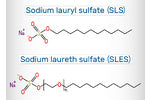Is Sodium Lauryl Sulfate Harmful?
Are you using sodium lauryl sulfate in your home? If so, you need to stop immediately! Sodium lauryl sulfate is a harsh detergent that can cause serious damage to your skin and hair among other things. In this blog post, we will discuss the dangers of sodium lauryl sulfate and how to avoid it.
What is Sodium Lauryl Sulfate?
Sodium lauryl sulfate is a detergent that is commonly used in shampoos, soaps, household cleaning products and toothpastes. Sodium lauryl sulfate is very harsh and can cause skin irritation, hair loss, and eye damage. In fact, sodium lauryl sulfate is so harsh that it is used as a degreaser in the automotive industry!

Why you shouldn't be using it?
1, 4 dioxane is a contaminant found in sodium lauryl sulfate, a detergent and surfactant. It is a colorless liquid with a sweet is a odor. 1, 4 dioxane is a known carcinogen and is listed as a hazardous air pollutant. Inhalation of vapors can cause eye and respiratory tract irritation. It can also be absorbed through the skin.
Sodium lauryl sulfate is a hormone disruptor that can interfere with the body's normal hormonal function. It is believed that this chemical can contribute to issues like infertility and hormone disruption. Studies have shown that sodium lauryl sulfate can mimic the effects of estrogen in the body, and it may also interfere with the production of testosterone. This chemical has been linked to a number of health problems and it is important to be aware of the risks it poses.
SLS is a penetration enhancer, meaning that it helps other chemicals to penetrate the skin. When SLS is used in personal care products, it can cause skin irritation and dryness. SLS has been found in breast milk in tests on mothers with new born babies.
Additionally, the chemical can be harmful to aquatic life if it enters waterways.
Are there many products with SLS in them?
SLS is in a wide range of products that you use every day. They can accumulate in your body over time. Here are some of the products you may find SLS in.
toothpaste
shampoo
liquid hand soap
body wash/cleanser
conditioner
bath oil/salts/soak
hair color and bleaching
eye liner
bubble bath
facial cleanser
bar soap
tooth whitening
brow liner
mouthwash
exfoliant/scrub
shaving cream
facial moisturizer/treatment
baby toothpaste
skin fading/lightener
shaving cream (men's)
hair styling aid
eye shadow
styling gel/lotion
foundation
moisturizer
hair treatment/serum
foot cleansing
beard cleanser
Are there Natural Alternatives?
There are many natural alternatives to SLS that are gentle and effective cleansing agents. Some natural alternatives to SLS include saponified oils such as olive oil or castor oil, soapwort root, or baking soda.
Our all natural liquid castile soap is a great alternative. It is very gentle to the skin and will not cause irritation. It is made with all natural saponified olive oil and coconut oil (not palm oil). Decyl Glucoside is another excellent alternative.
Conclusion
Sodium lauryl sulfate is a harsh chemical that can damage skin and hair over time. It’s important to avoid this ingredient in personal care products whenever possible. If you’re looking for an alternative, our Liquid castile soap is a great option. Our soap is made with all-natural ingredients and it doesn’t contain any harsh chemicals. Plus, it lathers up nicely so you can get clean without feeling dry or irritated. Try it today and see the difference for yourself!

